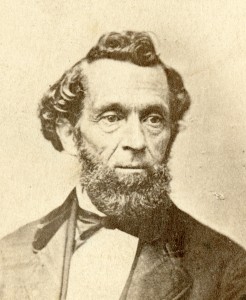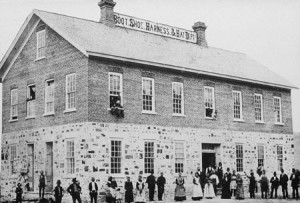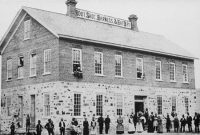During the decade beginning in 1864, under the direction of Apostle Lorenzo Snow, Brigham City became a glowing example of Zion-like self-sufficiency and independence from the American economic system. When an extended financial crisis hit Utah in 1873, Brigham City barely noticed and their economy expanded in that year more than ever.

Brigham City became “85 percent self sufficient”, they enjoyed full employment, built homes for widows and the poor, and even provided work and food for vagrants. Snow’s economic experiment was likely the model for the United Orders Brigham Young established later during the 1870s. In fact, President Young was reported to have said, “Brother Snow has led the people along, and got them into the United Order without their knowing it.”
How in the world did Apostle Snow pull off such a miracle during an extended economic downturn? Excellent question! And maybe by following his methods, we can better prepare ourselves for participation in Zion’s economy while insulating ourselves from the negative side-effects of Babylon’s. You game?
Here’s how he did it: (1) Established a single cooperative general store. (2) The profits were used to establish new cooperatives to manufacture consumer goods that otherwise had to be imported. A tannery and a woolen factory were the first. (3) Each new cooperative sold its goods through the original co-op store. (4) Profits from all the co-ops were pooled to establish additional needed factories, specialty farms, and even colonies.

Church Historian, Leonard J. Arrington, in his monumental work, “Great Basin Kingdom”, reported that “almost every conceivable good and service, from brooms and hats to molasses and furniture was produced and sold in one of these [cooperatives]…. Nearly all the workmen in this village of two thousand people owned shares in ‘The Co-op’ and were employed in one of [it’s] departments.” He also wrote, “Brigham City came to be recognized as a ‘hive of industry’ — one of the most prosperous and progressive settlements in the territory.” In fact, social entrepreneurs from as far away as England came to see what Snow and the Saints had accomplished.
As mentioned last time, Apostle Wilford Woodruff expressed the importance of the Saints achieving economic self-sufficiency when he stated, “Great Babylon is going to fall…. It is wisdom that we should lay the foundation to provide for ourselves.” If such an experiment as Brigham City were launched today, perhaps virtually at first, would you want to participate? Enough to work to help it succeed?
To share your thoughts on this article, subscribe to this site’s posts at the upper left, and you’ll be sent a login. I look forward to reading your responses!

Reviving Lorenzo Snow’s Stepping Stone to Zion
November 15, 2021 @ 10:03 am
[…] to do so under D&C 57’s good-things-of-their-own-will clause. We can do it by following Lorenzo Snow’s strategy that yielded remarkable results in making Brigham City into a world-renown example of Cooperative […]